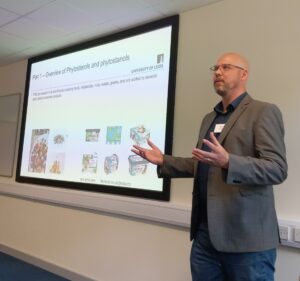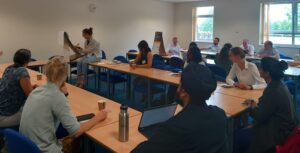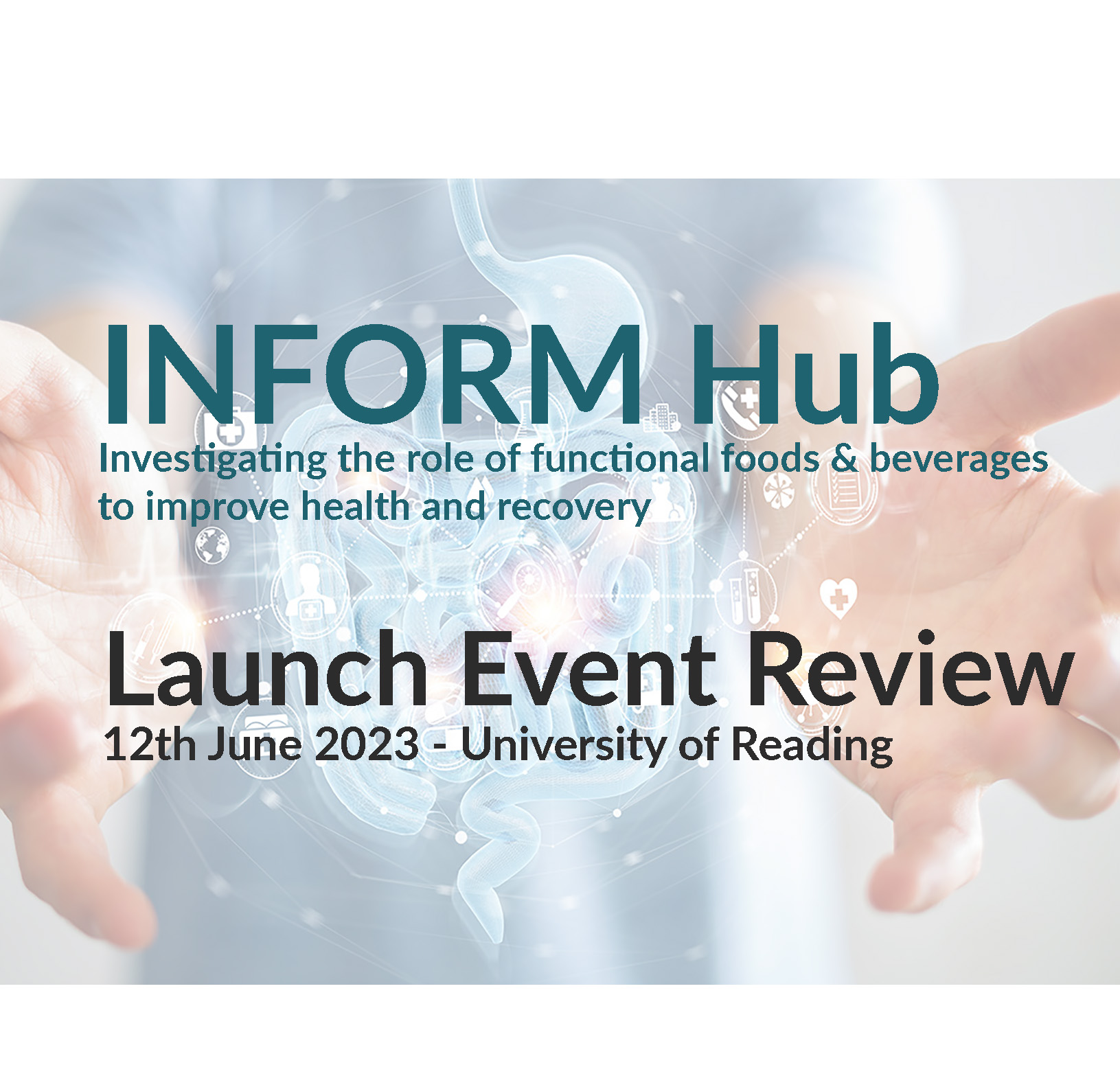The INFORM Hub launch event occurred at the University of Reading last month. The event had a great atmosphere and was well attended by academics, researchers, members of industry and curious minds.
Dr Gemma Walton (University of Reading/Hub Lead) opened the event by providing an overview of the OIRC hubs before exploring INFORM’s aims. She then had the pleasure of introducing our guest speakers, each a luminary in their respective fields.
Launch Event Speakers:
Professor Kieran Tuohy of the University of Leeds looked at Probiotics and the impact they have shown to have on the gut microbiota and systematic health, and some of the challenges that Probiotics face.
Professor Glenn Gibson of the University of Reading reviewed where we are today with Prebiotics and discussed expanding how prebiotics can function (not just fermentation) and what they can offer in the future.
Oliver Hasselwander from IFF gave an industrial perspective on key research considerations in the pre and probiotics field and discussed the particular importance of microbiome research and future studies to consider product characterisation, the baseline microbiome, diet-microbiota interactions, as well as mechanism of action.
 Dr James Thorne from the University of Leeds provided a fascinating overview on phytosterols and phytostanols in human health and discussed their emerging health and technology applications.
Dr James Thorne from the University of Leeds provided a fascinating overview on phytosterols and phytostanols in human health and discussed their emerging health and technology applications.
Maud Silvent and Sarah Williams from Reading Scientific Services Ltd followed on from James’ presentation with an industry perspective on plant stanols product development and analytical considerations, looking into some of the innovations in stanols, considerations when developing with sterols and Health claims and the regulatory landscape.
Dr Neil Williams of Nottingham Trent University provided a broad overview of Pro & Prebiotics for athletes and the active consumer. Looking into what an athlete’s gut microbiome looks like. Why athlete health issues are being targeted through the gut microbiota and diet, and how probiotic and prebiotic interventions may improve athlete health, with evidence from respiratory and gastrointestinal issues.
Dr Andrea Monteagudo from the University of Reading then gave a presentation on the microbiota-gut-brain axis and its mechanisms of action. Concluding understanding the connections between the gut microbiota and brain could provide new, safe and effective potential therapeutic options for neuropsychiatric and neurodegenerative diseases, and future multidisciplinary studies aimed to reveal specific mechanisms of actions for observational outcomes are essential to advance the field.
Continuing with the gut-brain axis, Professor Philip Burnet from the University of Oxford, Department of Psychiatry investigated Prebiotics and mental well-being. Considering studies completed under the scope of the microbiome-gut-brain axis, prebiotics and cognition and probiotics and mood and summarising that pre-clinical studies showing the central benefits of gut bacteria appear to be translational. There is a need to understand mechanisms which may not be the same as current pharmacotherapies or between species. There is evidence that pre/probiotics may assist in treating mood and cognitive disorders, and maintaining normal/healthy gut microbial communities may reduce the onset of brain disorders.
INFORM Hub’s Knowledge Exchange Fellow, Lorraine Bailey, rounded off the first session with a presentation on industry and academia partnering together towards a healthier nation and how fostering collaborations between academia and industry can help address the public health crisis.
 The afternoon began with Alan Barnard joining remotely and providing a captivating overview of using research to influence.
The afternoon began with Alan Barnard joining remotely and providing a captivating overview of using research to influence.
Alan is a world-class communications strategist and passionate campaigner who has dedicated his life to advocating for social and environmental justice. Alan has successfully effected meaningful change at a national level through his tireless efforts. He has collaborated with policymakers, scientists, and community leaders to push for legislative reforms and raise awareness about pressing issues. His work has not only brought about tangible improvements but has also inspired countless individuals to take action and become advocates for positive change themselves. Alan is a critical friend of the INFORM Hub with his involvement in the Human Microbiome APPG.
A breakout session followed Alan’s talk, where attendees joined a springboard group of their choice. Group themes included:

- Sports and Exercise
- Gut-Brain
- Infection Recovery
- Stanols and Sterols
- Pre/Probiotics
- and a Wildcard group
Each group then asked members to provide their considerations of:
- What should/could the priorities be in this area?
- What can be achieved with money and time restrictions?
- How can industry needs be met?
- How can academic needs be met?
- How can industry and academia support each other?
- How can this research have an impact?
- Does something need to be done additionally to lead to influence industry/academics/consumers/policy?
 Each group was led by an early career researcher (Connor Parker, Jess Eastwood, James Kennedy, Martin Chadwick, Giorgia Cioccoloni, Choshani, Dalukdeniya Arachchilage and Martin Chadwick) who each did a fantastic job of steering the conversation and feeding back key points to all. Important topics were raised and discussions were flowing. INFORM hopes to use some of the information gathered from these springboard sessions to ensure the overall aims of the hub are met and reflected in the themes of future funding calls.
Each group was led by an early career researcher (Connor Parker, Jess Eastwood, James Kennedy, Martin Chadwick, Giorgia Cioccoloni, Choshani, Dalukdeniya Arachchilage and Martin Chadwick) who each did a fantastic job of steering the conversation and feeding back key points to all. Important topics were raised and discussions were flowing. INFORM hopes to use some of the information gathered from these springboard sessions to ensure the overall aims of the hub are met and reflected in the themes of future funding calls.
James Phillips, Senior Portfolio Manager at the BBSRC, gave our final presentation providing an overview of the themes and the strategic areas for BBSRC investment in diet and health and advised of planning underway for phase 2 of the hubs, which would provide additional annual funding for cross-hub activities connecting teams from across the Hubs to advance research and innovation priorities in the programme’s strategic scope, which a focus on any Hub alone cannot achieve.
A final group discussion followed on potential cross-hub activities and the benefits to gain from these.
Throughout the day, networking opportunities were abundant, allowing attendees to connect with like-minded individuals, exchange ideas and hopefully foster initial steps in collaborations and shared commitment to advance the innovative methodology of the gut microbiome and health. Overall, the INFORM Launch event provided an enriching experience and served as a reminder of the importance of intellectual curiosity, collaboration, and the pursuit of knowledge.

